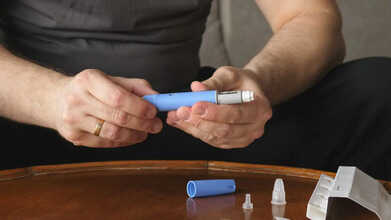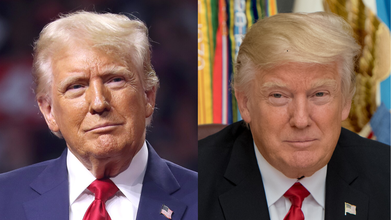- Health Conditions A-Z
- Health & Wellness
- Nutrition
- Fitness
- Health News
- Ayurveda
- Videos
- Medicine A-Z
- Parenting
- Web Stories
Trump Announces Plans To Cut Ozempic Costs; Doctors Call It A Potential Gamechanger

Credits: Canva
President Donald Trump announced that the cost of Novo Nordisk’s widely used diabetes and weight-loss drug, Ozempic, will be reduced. Speaking at a White House event focused on fertility treatments and drug pricing, Trump said the lower prices would follow prompt negotiations with the pharmaceutical company. “They’ll be much lower,” he told reporters, as per Fox News.
Trump Announces Plans To Cut Ozempic Costs
Novo Nordisk produces both Ozempic and Wegovy, which contain the same active ingredient, semaglutide, but are approved for different purposes. Ozempic, approved in 2017, is primarily used to treat Type 2 diabetes, with weight loss occurring as a side effect. Wegovy, approved four years later, is specifically intended for long-term weight management in adults who are obese or overweight and have at least one weight-related condition, such as high blood pressure or Type 2 diabetes. In recent years, demand for both drugs has surged, especially among people looking to lose weight.
During a Thursday Oval Office news conference focused on in vitro fertilization drugs, President Trump mentioned the idea of lowering prices for other medications, including Ozempic. His Centers for Medicare and Medicaid Administrator, Dr. Mehmet Oz, later cautioned that nothing had been finalized.
“In London, the same drug costs $130, but in New York, it’s $1,300,” Trump said during Thursday’s IVF announcement. “Now, instead of $1,300, people will be paying around $150.”
Still, Trump’s remarks generated significant attention. Patients struggling with the high cost of these drugs expressed hope for more affordable access, while doctors called the potential price reduction “huge for patients.” Wall Street also reacted: shares of Novo Nordisk and Eli Lilly, makers of GLP-1 drugs such as Ozempic, Wegovy, Mounjaro, and Zepbound, dropped sharply, erasing tens of billions of dollars in market value.
Novo Nordisk Shares Fall After Trump’s Comment
Shares of Eli Lilly & Co. and Novo Nordisk dropped in late trading after President Trump suggested that the price of the popular diabetes drug Ozempic could fall to about $150 per month. Currently, the U.S. list price for a month’s supply is around $1,000, with Trump referring to it as “the fat loss drug.” In response, Novo’s American depositary receipts fell up to 4.7 percent, while Lilly’s shares dropped as much as 5.3 percent.
Novo Nordisk has been in discussions about lowering drug costs since Trump sent letters to 17 major pharmaceutical companies urging price cuts. Ozempic and its counterpart, Wegovy, were also selected for price negotiations under the Inflation Reduction Act (IRA).
Most Favored Nation’ Drug Prices
President Trump has recently struck deals with Pfizer, AstraZeneca, and EMD Serono under the ‘Most Favored Nation’ pricing framework, with more agreements promised. These deals offer medicines at Most Favored Nation prices to Medicaid, which already receives substantial discounts, and to certain drugs available directly to consumers without insurance through the TrumpRx platform.
In exchange, pharmaceutical companies receive relief from potential tariffs, provided they continue investing in U.S. manufacturing and research.
Delhi High Court Permits JNTL to Sell ₹180-Crore ORSL Stock Despite FSSAI Dispute

Credits: Canva
The ongoing dispute over the use of “ORS” in beverage branding has escalated, as the Delhi High Court granted interim protection to JNTL Consumer Health (India), producer of the popular hydration drink ORSL.
Meanwhile, Hyderabad paediatrician Dr. Sivaranjani Santosh, who has long campaigned against the use of “ORS” in food and beverage names, reiterated her call for the Food Safety and Standards Authority of India (FSSAI) to enforce its recent ban rigorously.
Delhi High Court Grants Interim Relief to JNTL in ORSL Branding Dispute
The regulatory clash over the use of “ORS” in beverage branding has entered a new phase, with the Delhi High Court granting interim protection to JNTL Consumer Health (India), maker of the popular hydration drink ORSL.
The order follows JNTL’s challenge to the Food Safety and Standards Authority of India (FSSAI), which had abruptly withdrawn earlier permissions allowing the use of “ORS” with prefixes or suffixes in product trademarks. The company argued that the sudden decision—without prior notice, consultation, or hearing—threatened the sale of its existing stock, valued at approximately ₹180 crore.
The High Court’s temporary relief permits JNTL to continue selling its current stock until FSSAI addresses the matter, though production of new high-sugar ORSL variants remains on hold.
What is ORS?
Oral Rehydration Salts (ORS) are a crucial treatment for dehydration, particularly in children suffering from severe diarrhoea, heat-related illnesses, or conditions that lead to significant fluid loss. ORS consists of a precise combination of salt and sugar that is mixed with clean water. When used correctly, it replenishes fluids and electrolytes effectively, helping to manage childhood diarrhoea. It is essential to administer ORS under medical guidance, as improper use can be harmful and may lead to salt toxicity. This underscores the importance of clear labeling and the use of approved formulations.
Regulatory Context and Public Health Concerns
FSSAI’s 15 October clarification prohibits the use of “ORS” on any food or beverage label unless it is a genuine WHO-formula product. The regulation came after years of advocacy by doctors and health experts, including Hyderabad-based paediatrician Dr. Sivaranjani Santosh, who hailed the original ruling as “a people’s victory.”
While the court’s interim protection offers short-term relief for JNTL, public health advocates stress that decisive regulatory action is necessary to prevent misleading branding that could harm children.
A Doctor’s Persistent Campaign
For Dr. Sivaranjani, a senior paediatrician, first aid trainer, and social activist, the court order represents another chapter in an eight-year campaign to protect children and families from products misleadingly marketed with medical-sounding names. She was among the first to warn that commercial beverages labeled as ORS were often high in sugar and nutritionally different from the WHO-recommended Oral Rehydration Solution, a life-saving treatment for dehydration caused by diarrhoea or vomiting.
In a statement following the court order, Dr. Sivaranjani said, “The long battle we have won! ORSL cannot produce new high-sugar ORSL, but it wants to clear out its existing ₹180 crore stock. India, please stand with me! People’s power has to win against corporate lobbying.”
She further alleged that companies were attempting to influence media coverage and that she had received online threats for speaking out. “They are even reaching out to the media and threatening them with legal notices,” she said, urging citizens to raise awareness and pressure regulators to act swiftly.
Is US President Donald Trump Getting A Double Hip Replacement Surgery?

Credits: Wikimedia Commons
An exclusive published on tabloid Radar, on October 16, claimed that 70-year-old US President Donald Trump is 'riddled with arthritis', and may need a double hip replacement. The story has then been widely shared, however, the sources are anonymous.
Trump's mobility has become a heated topic of debate, however, his medical memos describe him as 'in exceptional health'.
What Does White House Say About Trump's Health?
White House released a formal memoranda from the physician to the President declaring routine examinations and reassuring the public that President's health is in exceptional condition. The memo is dated from April 2025 summary released by the White House and a July 2025 follow-up memorandum. The official memos detail a comprehensive physical examination of President Trump.
However, the memo do not note for orthopedic need or surgery.
Where Is The Claim Based On?
The tabloid’s report paints a sensational picture of severe arthritis and an alleged plan for double hip replacement, citing unnamed “sources” and hinting at possible cognitive issues. The story has since been picked up by several aggregator sites, spreading widely despite the absence of verified evidence.
Importantly, the publication provides no medical records, surgeon’s statement, or official hospital documentation to substantiate its claims. In the absence of such primary proof, the report remains unverified speculation.
However, as per the physical examination by the Walter Reed National Medical Center, President had no orthopedic surgery listed in his history.
White House again released statements and a semiannual physical note in October 2025, that contained results from preventive care and imagine performed. As per the results, Trump 'remains in exceptional health'.
The official documents specifically mention diagnoses like chronic venous insufficiency, a common cause of leg swelling in older adults, but make no reference to any scheduled hip surgery or confirmed cases of bilateral hip failure. While this doesn’t rule out a potential orthopedic concern, it does indicate that there is no primary, verifiable evidence from the White House or Walter Reed suggesting any planned surgical procedure.
What Is A Double Hip Replacement?
As per NIH researchers, a double hip replacement, also known as a bilateral hip replacement, is a surgical procedure where both hip joints are replaced in a single operation. This is performed when both hips are severely damaged, often due to conditions like osteoarthritis or rheumatoid arthritis. The procedure can be done simultaneously (one surgery) or in stages (separate surgeries), but the simultaneous approach is often preferred as it typically has a shorter overall recovery time and lower risk of systemic complications like blood clots compared to two separate surgeries.
Baek Se-hee, South Korean Author, Dies At 35, While Saving 5 Lives

Credits: Wikimedia Commons
South Korean author Baek See-he, who courageously chronicled her struggles with mental health in the bestselling memoir I Want to Die but I Want to Eat Tteokbokki, passed away at the age of 35. Her death was announced by the Korea Organ Donation Agency, which revealed that Baek donated her heart, lungs, liver, and kidneys, ultimately saving five lives.
While the exact cause of her death was not disclosed, Baek’s writing had already offered readers a deeply personal glimpse into her battles with depression and anxiety. Her 2018 memoir captures dialogues with her psychiatrist over twelve weeks, combined with reflective essays that explore the cycles of self-abuse and the challenges of living with a persistent depressive disorder. Following the success of her first book, Baek published a sequel in 2019, I Want to Die but I Still Want to Eat Tteokbokki, which delves into the ongoing journey of striving for contentment, highlighting her openness and vulnerability.
Baek’s Battle with Dysthymia
Baek openly discussed her long-standing struggle with dysthymia, a mild but persistent form of depression. According to the National Institutes of Mental Health, dysthymia affects roughly 2 percent of adults worldwide. The condition is believed to have a combination of biological, psychological, genetic, and environmental factors, although no specific genes have yet been linked to it. Chronic stress and trauma are also known contributors.
Symptoms of dysthymia are generally milder than major depression but are long-lasting. They often include a consistently sad or anxious mood, difficulty concentrating or making decisions, low energy, hopelessness, changes in appetite or weight, disturbed sleep patterns, and low self-esteem. Treatment typically involves a combination of medication and therapy. Antidepressants can take several weeks to show full effects, and cognitive behavioral or interpersonal therapy helps patients manage distorted thoughts, improve relationships, and navigate stress.
A Legacy Through Organ Donation
Baek’s passing was marked not only by sorrow but also by the profound impact of her organ donation. According to reports cited by The Guardian and The Telegraph India, her heart, lungs, liver, and both kidneys were recovered at the National Health Insurance Service Ilsan Hospital in Gyeonggi Province, north of Seoul—the same hospital where she was born. Baek was declared brain-dead on October 16, and her decision to donate her organs has given five people a chance at life.
Born in 1990, Baek studied creative writing at university before working for five years in a publishing house. She shared her home with her rescue dog, Jaram, and underwent psychiatric treatment for dysthymia for over a decade. The idea for her memoir grew out of her blog posts sharing therapy notes, which drew significant positive feedback from readers.
Her memoir, published in Korea in 2018 and in the UK in 2022 by Bloomsbury, combines candid discussions with her psychiatrist with reflective essays, presenting a clear-eyed yet compassionate look at living with a chronic mental health condition. Her follow-up book, released in the UK last year, continued this narrative, exploring her ongoing journey toward self-acceptance and emotional resilience.
Writing That Resonated Worldwide
Baek’s memoir, named after her favourite Korean dish, tteokbokki—a spicy rice cake dish—struck a chord with readers, selling around 600,000 copies in Korea and over a million worldwide. Her work has been published in more than 25 countries, offering a rare, unflinching insight into mental health while inspiring empathy and understanding.
© 2024 Bennett, Coleman & Company Limited

